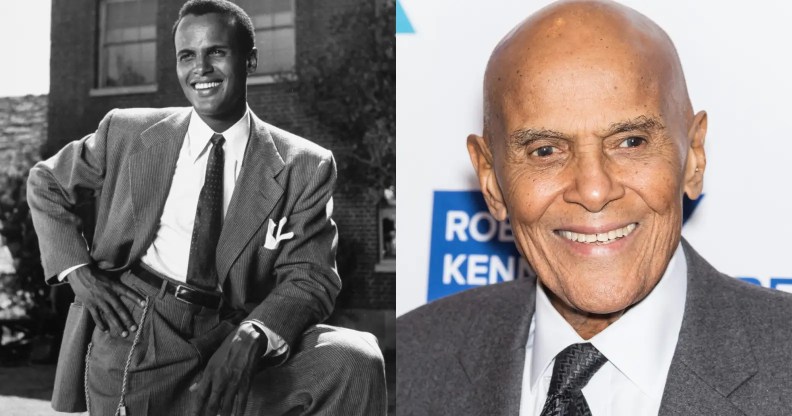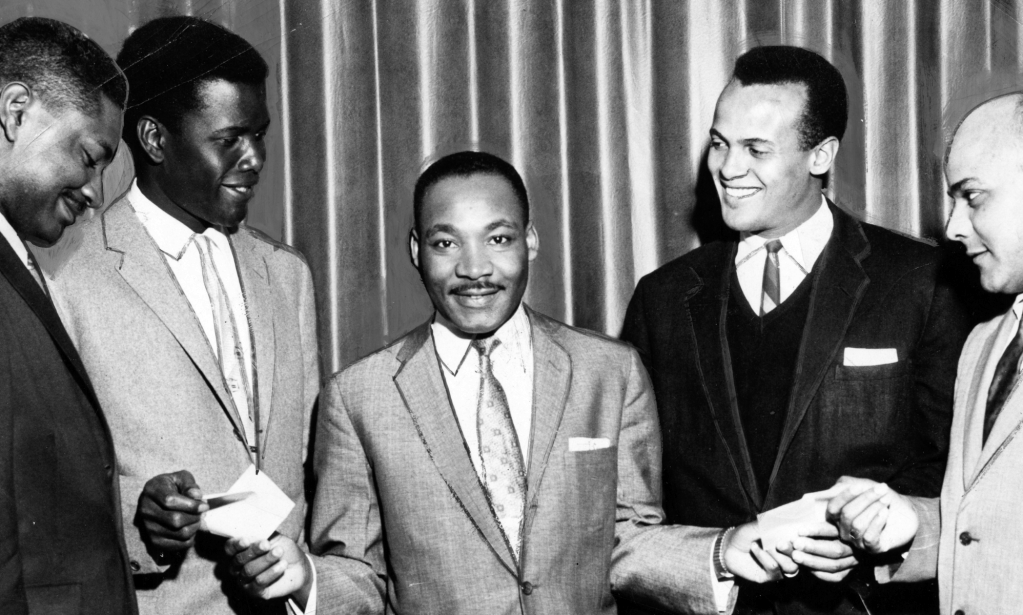Harry Belafonte: Late singer, actor and civil rights legend was also a vocal LGBTQ+ ally

Harry Belafonte, “King of Calypso” has passed away at the age of 96. (Credit: Getty Images)
Harry Belafonte’s legacy of activism is being remembered after his death – the singer and actor fought for Black civil rights, campaigned against HIV stigma and rallied for the rights of the LGBTQ+ community worldwide.
Belafonte died of congestive heart failure on Tuesday (25 April), at the age of 96.
He was born in 1927 in Harlem, New York, but lived in his parents’ native country, Jamaica, for eight years. When he returned to the US, he took odd jobs before joining the US Navy in 1944.
But he was destined for a life in Hollywood.
His ascent to the top started when he became involved with the American Negro Theatre, where he worked as a stage hand and performer and befriended another rising star, Sidney Poitier. However, despite beginning his career in entertainment as an actor, he truly shone as singer.
He signed to RCA Victor in 1953, and his third album Calypso, released three years later, would cement his place in musical history.
It would become the first album to sell a million copies within a year, spending 31 weeks at the top of the Billboard charts. The lead track, Day-O (The Banana Boat Song), became his signature tune and spent 18 weeks in the UK singles chart.
Belafonte was the first Jamaican-American to win an Emmy, for the TV special Revlon Revue: Tonight with Belafonte in 1959. He later became an EGOT – one of a rare group of people who have received all four of entertainment’s biggest awards, an Emmy, a Grammy, an Oscar and a Tony.
As his career skyrocketed, he became one of the stars of Hollywood’s Golden Age, appearing in films such as Carmen Jones, Island in the Sun and The World, the Flesh and the Devil. But, Belafonte wasn’t satisfied with the roles he was given due to racial stereotyping and focused on his music and activism. He would return to the big screen later in life, in films such as Spike Lee’s BlacKkKlansman.
Harry Belafonte worked with Martin Luther King Jr and spoke out on HIV/AIDS
Belafonte was close friends with Martin Luther King Jr, reportedly bailing him out of jail in Birmingham, Alabama, in 1963. He co-organised the march that same year which would lead to King’s famous “I have a dream” speech at the Lincoln Memorial in Washington, and funded the Student Nonviolent Coordinating Committee’s efforts to enrol Black voters in Mississippi in 1964.

But Belafonte was also a strong advocate for LGBTQ+ rights. He was appointed a UNICEF goodwill ambassador in 1987, and later campaigned to eradicate AIDS in Africa and fought the stigma that surrounded HIV/AIDS.
In 2014, he wrote a moving article for CNN, attacking Uganda for its anti-gay laws.
“Apart from being a flagrant abuse of human rights, the new law will severely impede the efforts of any organisation conducting HIV prevention and outreach programmes serving gay men in Uganda,” he said.
“Gay men, other men who have sex with men, and transgender individuals are disproportionately affected by HIV/AIDS, in Uganda and the world over. Driving a community that is already stigmatised further into the shadows will seriously undermine progress on the global epidemic, progress that depends on reaching the most vulnerable populations.”
Belafonte touched people through his music, films and activism and tributes poured him after his spokesman, Ken Sunshine, broke the news of his death to The New York Times.
Bernice King, Dr King’s daughter, took to Twitter to express her admiration. “When I was a child, #HarryBelafonte showed up for my family in very compassionate ways,” she wrote. “In fact, he paid for the babysitter for me and my siblings.”
She shared a picture of Belafonte mourning with her mother, Coretta Scott King, after Dr King’s assassination in 1968.
Oprah also bade farewell to the “King of Calypso” and took to Instagram to share a picture of her interviewing him, writing: “Another ‘great tree’ has fallen: Harry Belafonte, a trailblazer and hero to us all. Thank you for your music, your artistry, your activism, your fight for civil rights and justice – especially risking your life back in the day to get money to the movement. Your being here on Earth has blessed us all.”
Jamie Lee Curtis also shared a picture of Belafonte with her parents, films stars Janet Leigh and Tony Curtis, on the cover of Ebony magazine. It was the first time two caucasians and one Black person had been on a cover together.
Curtis wrote: “Artists uniting to use their art form to make transformational change in the world through music and movies and books, and poetry and paintings and photography… is one of the great benefits to living a public life. Harry Belafonte exemplified this.”
Belafonte is survived by his third wife, Pamela Frank, and his four children.

